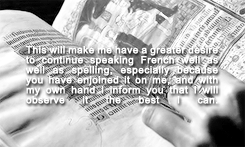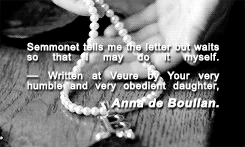lochiels:→ THE LIFE OF A N N E B O L E Y N | Part 01/04 - La Petite Boulaine In 1513, Anne Boleyn
lochiels:→ THE LIFE OF A N N E B O L E Y N | Part 01/04 - La Petite Boulaine In 1513, Anne Boleyn, was sent to the Hapsburg Empire as a young girl to become a maid-of-honour in the palace of the Archduchess Margaret of Austria, in modern-day Belgium. Anne was escorted from her family home in Kent to the Hapsburg Court in Brussels with Claude Bouton, a Flemish nobleman in the Archduchess’s service. No reference is made of a female chaperone, which would almost certainly have been required if Anne had been anywhere near the age of twelve, by which point Canon Law at the time claimed she was legally and biologically a woman. Thus this leads you to believe that Anne was born in 1507 rather than 1501.“I have received your letter by the Esquire [Claude] Bouton who has presented your daughter to me, who is very welcome, and I am confident of being able to deal with her in a way which will give you satisfaction, so that on your return the two of us will need no intermediary other than she. I find her so bright and pleasant for her young age that I am more beholden to you for sending her to me than you are to me.” — Margaret of Austria to Thomas BoleynA PRINCELY EDUCATION Margaret assigned Anne a tutor named Symonnet to help her improve her French and Anne would also have learned many other skills, such as deportment, conversation, dance and music. Hugh Paget quotes Jane de Longh (author of Margaret of Austria, Regent of the Netherlands), as saying of Margaret’s court, “The nobles and ladies of her court reflected the influence of the taste and preferences of their mistress. They made music, wrote poetry, composed and recited at this little court in the quiet and seclusion of Malines.” A letter the young Anne wrote from her time in the Archduchess’s household is usually held up as incontrovertible proof that Anne was born in the earlier date of 1501. Although since arriving at the Hapsburg court, Anne had been given rigorous instruction in learning French and some Latin and for the first time she wrote back to her father in the new language he wanted her to master. Some have claimed the handwriting in the letter is impossibly mature for a girl of seven and that Anne was therefore about thirteen at the time she wrote it. However, as Professor Warnicke has pointed out in her book The Rise and Fall of Anne Boleyn, the letter actually consists of ‘extremely bad handwriting, like that of a small child’. Either in the winter of 1514 or early in 1515, Anne left the Archduchess’s household and was moved to Paris, where she joined the household of the Queen of France. Her father spent much of his time there as one of England’s ambassadors to the French Court and given that his youngest daughter was by now fluent in French, it seems very likely that she acted as translator when her father had an audience with the Queen. From her time in France, we also know that Anne was clearly on friendly terms with the Queen’s younger sister, Princess Renée, later Duchess of Ferrara, because forty years later the princess made a point of discussing her relationship with Anne Boleyn with Sir Nicholas Throckmorton, then the English Ambassador to Paris. The princess remarked to Sir Nicholas that she had a special fondness for his queen Elizabeth, due to her childhood friendship with Anne Boleyn and we know that Renée was born in 1510, making it highly unlikely that she would have been friends with someone nine years her senior, if Anne was born in 1501. [x]“Whose approved and excellent virtues, that is to say, the purity of her life, her constant virginity, her maidenly and womanly pudicity, her soberness, her chasteness, her meekness, her wisdom, her descent of right noble and high parentage, her education in all good and laudable thewes and manners, her aptness to procreation of children, with other infinite good qualities, more to be regarded and esteemed than the only progeny, be of such approved excellency as cannot be but most acceptable unto Almighty God, and deserve His high grace and favour, to the singular weal and benefit of the King’s realm and subjects.” — Henry VIII praises his wife -- source link
#history#english history#anne boleyn#queens#wonderful









